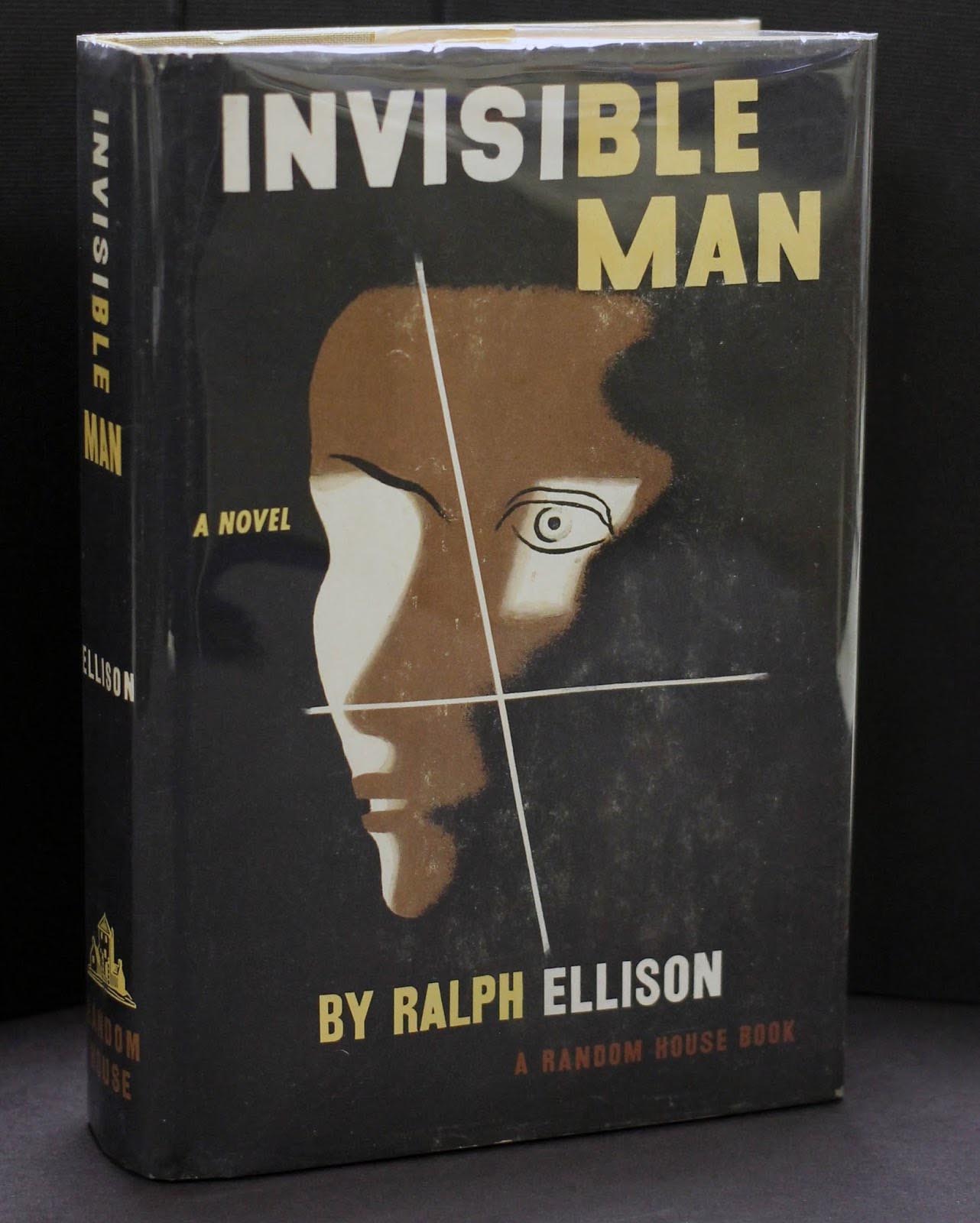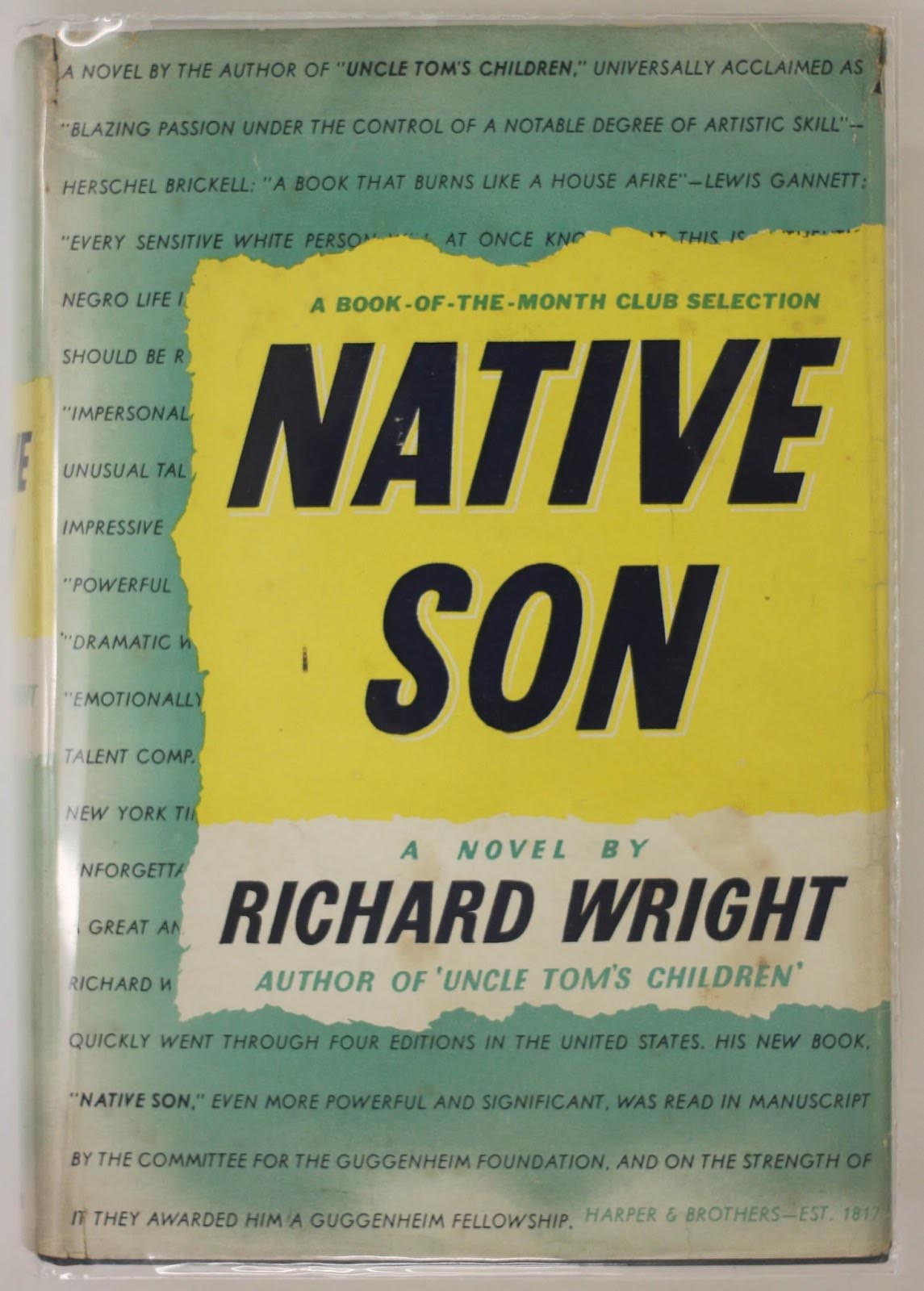Wright and Ellison First Editions
September 1, 2015
Description by Surella Evanor Seelig, Archives & Special Collections Outreach Librarian.
 Brandeis Special Collections is proud to announce the recent acquisition of two important first editions: Richard Wright’s “Native Son” and Ralph Ellison’s “Invisible Man.” In these novels, Ellison and Wright delivered hugely impactful literary comments on African-American experiences in 20th-century America. Both award-winning novels (“Native Son” won the 1941 Spingarn Medal and was named “The Most Distinguished American Novel Published Since 1939” by American Writers Congress; “Invisible Man” won the 1953 National Book Award), “Native Son” and “Invisible Man” continue to be taught, read and debated to this day.[1] These acquisitions enhance Brandeis’s already strong twentieth-century American literature collection (which includes archival collections of Joseph Heller and John Cheever as well as many literary first editions), and they particularly enrich the department's collection of African-American literature.
Brandeis Special Collections is proud to announce the recent acquisition of two important first editions: Richard Wright’s “Native Son” and Ralph Ellison’s “Invisible Man.” In these novels, Ellison and Wright delivered hugely impactful literary comments on African-American experiences in 20th-century America. Both award-winning novels (“Native Son” won the 1941 Spingarn Medal and was named “The Most Distinguished American Novel Published Since 1939” by American Writers Congress; “Invisible Man” won the 1953 National Book Award), “Native Son” and “Invisible Man” continue to be taught, read and debated to this day.[1] These acquisitions enhance Brandeis’s already strong twentieth-century American literature collection (which includes archival collections of Joseph Heller and John Cheever as well as many literary first editions), and they particularly enrich the department's collection of African-American literature.
Additionally, the Ellison and Wright acquisitions are interesting because of their connection with several other collections held in this department. A portrait of a young Wright can be found in the Carl Van Vechten collection of photographs and Ellison wrote several pieces for The New Masses, an American Marxist magazine, several issues of which can be found in the Radical Pamphlet collection. As well, these particular first editions are notable and rare for being in excellent condition, with their original cloth bindings. They are made even rarer by their original, first issue dust jackets, also in excellent condition.
 Ellison and Wright had a long friendship and powerful literary relationship, which began with Wright acting as a kind of guide to Ellison. “Beginning in June of 1937, at Ellison’s urging, Richard Wright served as the younger writer’s intellectual and literary mentor for many years. Langston Hughes had introduced Ellison to Wright’s penetrating poetry, including ‘Between the World and Me,’ which had appeared in the then-Communist literary journal Partisan Review. Wright was one of the first politically and philosophically complex black authors Ellison encountered in New York…Wright’s deep-South origins and his commitment to exposing glaring racial and social injustice were attractive to the younger man.”[2] Their relationship was not without its difficulties, however, as the two authors differed on many issues, not the least of which was their understanding of and approach to portraying African-American lives in 20th-century America. “The tension between the two writers only intensified after 1968, when Wright’s dark vision of unresolved racial antagonism appeared more useful to a vocal and defiant black generation than Ellison’s offerings of high art and intellectual democracy.”[3] The divergent artistic and intellectual approaches to their work, coupled with the influential relationship between the two authors, give these tandem acquisitions additional piquancy.
Ellison and Wright had a long friendship and powerful literary relationship, which began with Wright acting as a kind of guide to Ellison. “Beginning in June of 1937, at Ellison’s urging, Richard Wright served as the younger writer’s intellectual and literary mentor for many years. Langston Hughes had introduced Ellison to Wright’s penetrating poetry, including ‘Between the World and Me,’ which had appeared in the then-Communist literary journal Partisan Review. Wright was one of the first politically and philosophically complex black authors Ellison encountered in New York…Wright’s deep-South origins and his commitment to exposing glaring racial and social injustice were attractive to the younger man.”[2] Their relationship was not without its difficulties, however, as the two authors differed on many issues, not the least of which was their understanding of and approach to portraying African-American lives in 20th-century America. “The tension between the two writers only intensified after 1968, when Wright’s dark vision of unresolved racial antagonism appeared more useful to a vocal and defiant black generation than Ellison’s offerings of high art and intellectual democracy.”[3] The divergent artistic and intellectual approaches to their work, coupled with the influential relationship between the two authors, give these tandem acquisitions additional piquancy.
New Additions to the Collection

“On Native Son,” published by Harper Brothers in 1940:
“[A] bleak and ungenerous depiction of black life,” Wright’s “Native Son” “sold an astonishing 215,000 copies within three weeks of publication. Thus, a great many people received a swift and unsparing education in the conditions in which blacks lived in ghettos all over America.” [February 2015 New York Times piece discussing the lasting impact and significance of “Native Son”][4]
“On Invisible Man,” published by Random House in 1952:
“‘Invisible Man’ is tough, brutal and sensational…it blazes with authentic talent. No one interested in books by or about American Negroes should miss it.” [Original New York Times review of “Invisible Man.”[5]
“Ellison's 1952 novel, ‘Invisible Man,’ is a searing exploration of race and identity. [2014 NPR piece marking Ellison's 100th birthday][6]
Notes
- “Spingarn Award to Richard Wright” New York Times, February 1, 1941, page 18; “‘Native Son’ Wins Award for Novel” New York Times, June 8, 1941, page 46; “National Book Awards” New York Times, January 31, 1953.
- Jackson, Lawrence P. “The Birth of the Critic: The Literary Friendship of Ralph Ellison and Richard Wright.” American Literature, Volume 72, Number 2, June 2000, pages 321-322.
- Ibid., pages 349-350.
- Mathis, Ayana. “James Baldwin Denounced Richard Wright’s ‘Native Son’ As a ‘Protest Novel.’ Was He Right?” New York Times, February 24, 2015.
- Prescott, Orville. “Books of the Times: ‘Invisible Man’ by Ralph Ellison.” New York Times, April 16, 1952.
- Vitale, Tom. “Ralph Ellison: No Longer The 'Invisible Man' 100 Years After His Birth” NPR, May 30, 2014 4:46 PM ET.